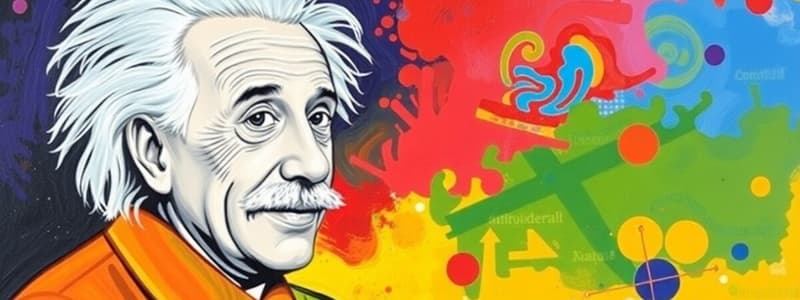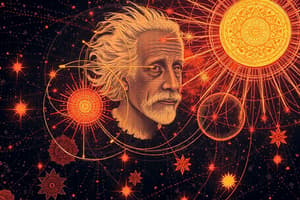Podcast
Questions and Answers
What significant state of matter did Satyendra Nath Bose predict?
What significant state of matter did Satyendra Nath Bose predict?
- Plasma
- Metallic
- Bose-Einstein Condensate (correct)
- Solid
In which year did Satyendra Nath Bose develop his theory related to light particles?
In which year did Satyendra Nath Bose develop his theory related to light particles?
- 1924 (correct)
- 1930
- 1920
- 1932
How did Albert Einstein respond to Satyendra Nath Bose's work?
How did Albert Einstein respond to Satyendra Nath Bose's work?
- He dismissed it as irrelevant
- He was greatly impressed and used his formulations (correct)
- He was unimpressed and made no comments
- He decided to collaborate with Bose on a separate project
What contribution did Einstein make to quantum theory?
What contribution did Einstein make to quantum theory?
Where was Satyendra Nath Bose born?
Where was Satyendra Nath Bose born?
What theory did Albert Einstein publish in 1915?
What theory did Albert Einstein publish in 1915?
In what year did Einstein win the Nobel Prize in Physics?
In what year did Einstein win the Nobel Prize in Physics?
Which scientific field did Einstein notably contribute to through his published papers in 1905?
Which scientific field did Einstein notably contribute to through his published papers in 1905?
What significant event prompted Einstein to emigrate to the US in 1933?
What significant event prompted Einstein to emigrate to the US in 1933?
What role did Einstein have at the University of Bern in 1908?
What role did Einstein have at the University of Bern in 1908?
What does the equation E=mc² demonstrate?
What does the equation E=mc² demonstrate?
What do Einstein's predictions about gravity illustrate during the total solar eclipse in 1919?
What do Einstein's predictions about gravity illustrate during the total solar eclipse in 1919?
How does Einstein's general theory of relativity explain gravity?
How does Einstein's general theory of relativity explain gravity?
What happens to mass during the process of nuclear power generation?
What happens to mass during the process of nuclear power generation?
What was Einstein's experience with geometry at the age of 12?
What was Einstein's experience with geometry at the age of 12?
Flashcards are hidden until you start studying
Study Notes
Albert Einstein
- German-born physicist who revolutionized our understanding of space, time, and gravity with his theories of relativity
- His insights paved the way for groundbreaking technologies like nuclear energy and solar power
Milestones
- Published four scientific papers in 1905 that garnered widespread attention from the academic world
- Published his "General Theory of Relativity" in 1915 while a professor at the University of Berlin
- Awarded the Nobel Prize in Physics in 1921 for his contributions to theoretical physics
- Emigrated to the US in 1933 due to the rise of Nazism and anti-Semitism in Germany
- Signed the Russell-Einstein Manifesto in 1955 to warn the public about the dangers of nuclear weapons development
Seminal Work and Early Life
- Born to Jewish parents in Ulm, Germany, Einstein displayed a natural aptitude for mathematics and learning
- His schooling took place in Switzerland after periods in Munich and Italy
- Due to his father's business failure, the family moved
- Einstein eventually worked as a clerk in the Swiss patent office. This provided him with the crucial time needed to pursue his own scientific interests
- Through innovative thought experiments, he made major strides in physics
Landmark Findings
- Published groundbreaking papers in Annalen der Physik in 1905 that addressed the photoelectric effect and Brownian motion
- These explained observed phenomena that had previously been a mystery
- Submitted his doctoral thesis at the University of Zurich in 1905
Career and Recognition
- Became a university lecturer at the University of Bern, Switzerland, in 1908
- His complex theories and unconventional personality garnered a dedicated following
Satyendra Nath Bose
- Born in Kolkata, India
- Studied the behavior of light particles
- In 1924, he developed a theory to predict a fifth state of matter, known as Bose-Einstein Condensate (BEC)
- Einstein was greatly impressed by Bose's work and used his formulations to predict the fifth state of matter
Relativity and Energy
- Einstein's fourth paper about special relativity extended and proved that mass and energy are relative, aspects of the same property
- Expressed as E=mc², where:
- E represents energy
- m represents mass
- c represents the speed of light
- The speed of light (c²) is a very large number (approximately 90 million billion)
- Therefore, even a small amount of mass can contain a significant amount of energy
- This principle is the basis of nuclear power
- Atomic nuclei can be broken apart, losing mass and releasing large amounts of energy
Testing the theory
- Einstein's predictions about gravity were tested during a total solar eclipse in 1919
- Observations indicated stars appeared to be out of place, due to light bending around the Sun
- This was not consistent with Newton's theory of gravity, but corresponded precisely with Einstein's general theory of relativity
General theory of relativity and gravity
- Einstein's general theory of relativity explains gravity not as a force, but as a distortion of spacetime caused by objects with large mass
- Imagine a bowling ball on a rubber sheet; the bowling ball creates a dip, and smaller objects (like marbles) will roll towards it
Timeline
- Learned Euclidean geometry at age 12
- Published over 300 scientific papers during his lifetime
Studying That Suits You
Use AI to generate personalized quizzes and flashcards to suit your learning preferences.





